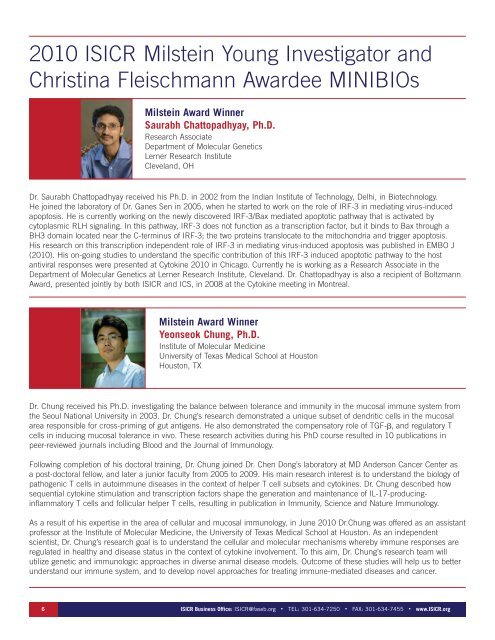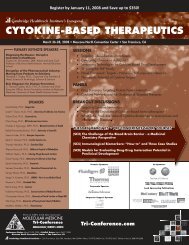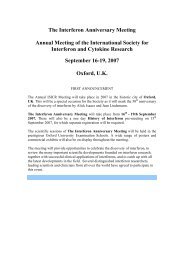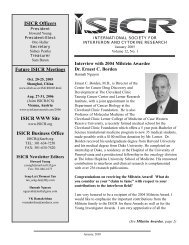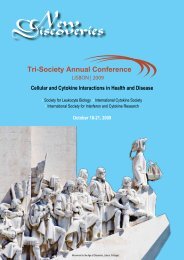9th Joint Meeting ISICR-ICS Cytokines & Interferons: From the ...
9th Joint Meeting ISICR-ICS Cytokines & Interferons: From the ...
9th Joint Meeting ISICR-ICS Cytokines & Interferons: From the ...
You also want an ePaper? Increase the reach of your titles
YUMPU automatically turns print PDFs into web optimized ePapers that Google loves.
2010 <strong>ISICR</strong> Milstein Young Investigator and<br />
Christina Fleischmann Awardee MINIBIOs<br />
Milstein Award Winner<br />
Saurabh Chattopadhyay, Ph.D.<br />
Research Associate<br />
Department of Molecular Genetics<br />
Lerner Research Institute<br />
Cleveland, OH<br />
Dr. Saurabh Chattopadhyay received his Ph.D. in 2002 from <strong>the</strong> Indian Institute of Technology, Delhi, in Biotechnology.<br />
He joined <strong>the</strong> laboratory of Dr. Ganes Sen in 2005, when he started to work on <strong>the</strong> role of IRF-3 in mediating virus-induced<br />
apoptosis. He is currently working on <strong>the</strong> newly discovered IRF-3/Bax mediated apoptotic pathway that is activated by<br />
cytoplasmic RLH signaling. In this pathway, IRF-3 does not function as a transcription factor, but it binds to Bax through a<br />
BH3 domain located near <strong>the</strong> C-terminus of IRF-3; <strong>the</strong> two proteins translocate to <strong>the</strong> mitochondria and trigger apoptosis.<br />
His research on this transcription independent role of IRF-3 in mediating virus-induced apoptosis was published in EMBO J<br />
(2010). His on-going studies to understand <strong>the</strong> specific contribution of this IRF-3 induced apoptotic pathway to <strong>the</strong> host<br />
antiviral responses were presented at Cytokine 2010 in Chicago. Currently he is working as a Research Associate in <strong>the</strong><br />
Department of Molecular Genetics at Lerner Research Institute, Cleveland. Dr. Chattopadhyay is also a recipient of Boltzmann<br />
Award, presented jointly by both <strong>ISICR</strong> and <strong>ICS</strong>, in 2008 at <strong>the</strong> Cytokine meeting in Montreal.<br />
Milstein Award Winner<br />
Yeonseok Chung, Ph.D.<br />
Institute of Molecular Medicine<br />
University of Texas Medical School at Houston<br />
Houston, TX<br />
Dr. Chung received his Ph.D. investigating <strong>the</strong> balance between tolerance and immunity in <strong>the</strong> mucosal immune system from<br />
<strong>the</strong> Seoul National University in 2003. Dr. Chung’s research demonstrated a unique subset of dendritic cells in <strong>the</strong> mucosal<br />
area responsible for cross-priming of gut antigens. He also demonstrated <strong>the</strong> compensatory role of TGF-‚ and regulatory T<br />
cells in inducing mucosal tolerance in vivo. These research activities during his PhD course resulted in 10 publications in<br />
peer-reviewed journals including Blood and <strong>the</strong> Journal of Immunology.<br />
Following completion of his doctoral training, Dr. Chung joined Dr. Chen Dong’s laboratory at MD Anderson Cancer Center as<br />
a post-doctoral fellow, and later a junior faculty from 2005 to 2009. His main research interest is to understand <strong>the</strong> biology of<br />
pathogenic T cells in autoimmune diseases in <strong>the</strong> context of helper T cell subsets and cytokines. Dr. Chung described how<br />
sequential cytokine stimulation and transcription factors shape <strong>the</strong> generation and maintenance of IL-17-producinginflammatory<br />
T cells and follicular helper T cells, resulting in publication in Immunity, Science and Nature Immunology.<br />
As a result of his expertise in <strong>the</strong> area of cellular and mucosal immunology, in June 2010 Dr.Chung was offered as an assistant<br />
professor at <strong>the</strong> Institute of Molecular Medicine, <strong>the</strong> University of Texas Medical School at Houston. As an independent<br />
scientist, Dr. Chung’s research goal is to understand <strong>the</strong> cellular and molecular mechanisms whereby immune responses are<br />
regulated in healthy and disease status in <strong>the</strong> context of cytokine involvement. To this aim, Dr. Chung’s research team will<br />
utilize genetic and immunologic approaches in diverse animal disease models. Outcome of <strong>the</strong>se studies will help us to better<br />
understand our immune system, and to develop novel approaches for treating immune-mediated diseases and cancer.<br />
6 <strong>ISICR</strong> Business Office: <strong>ISICR</strong>@faseb.org • TEL: 301-634-7250 • FAX: 301-634-7455 • www.<strong>ISICR</strong>.org


